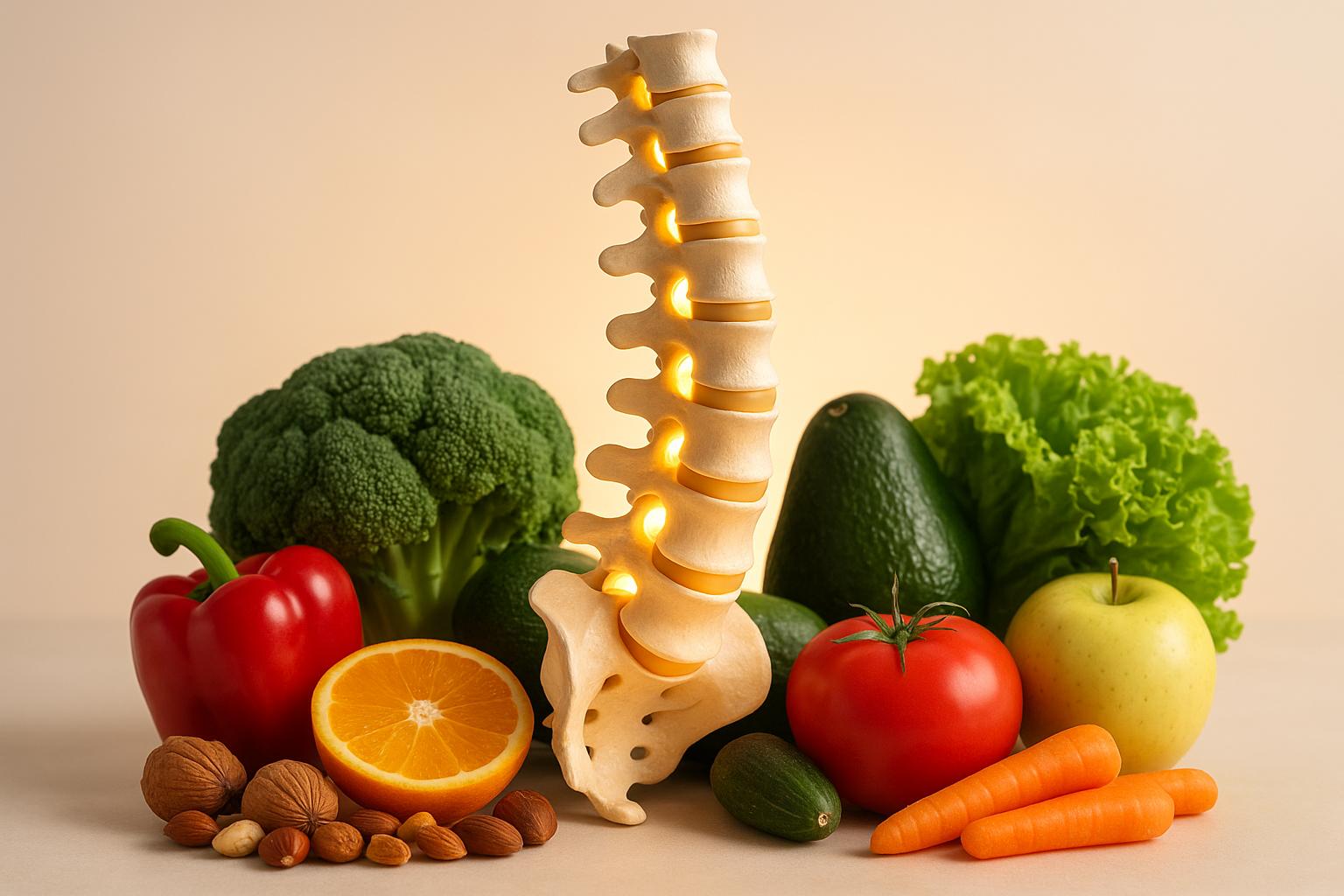Your spine needs specific nutrients to stay strong and healthy. Without them, you risk issues like chronic pain, weak bones, and spinal degeneration. Here’s the key takeaway: poor nutrition can quietly damage your spine over time, but targeted changes can reverse the effects.
Key Points:
- Calcium & Vitamin D: Strengthen bones and prevent fractures.
- Magnesium: Supports muscle function and reduces tension.
- Protein: Repairs tissues and supports spinal muscles.
- Vitamin C & Zinc: Aid tissue repair and control inflammation.
- Omega-3s: Reduce chronic inflammation linked to spinal issues.
Action Plan:
- Get tested: Identify any deficiencies through blood tests.
- Improve your diet: Add leafy greens, fatty fish, nuts, seeds, and water-rich foods.
- Consider supplements: Especially for calcium, vitamin D, and magnesium.
- Stay active: Weight-bearing exercises help strengthen bones and muscles.
- Seek professional help: Combine nutritional changes with chiropractic care for better results.
By addressing these gaps, you can reduce back pain, improve flexibility, and protect your spine’s long-term health.
Key Vitamin Deficiencies Causing Your Back Pain
Key Nutritional Deficiencies That Damage Your Spine
Nutrition isn’t just about fueling your body – it’s a cornerstone of spinal health. When your diet lacks certain nutrients, you increase the risk of spinal injuries, degeneration, and chronic pain. Let’s break down the key deficiencies that can seriously impact your spine and how you can address them.
Calcium and Vitamin D: The Backbone of Strong Bones
Calcium and vitamin D are a dynamic duo when it comes to keeping your spine strong. Calcium provides the structural support for your vertebrae, while vitamin D ensures your body can absorb and use calcium effectively. Without enough vitamin D, your body starts pulling calcium from your bones, weakening their structure and leaving your spine vulnerable.
The numbers are concerning: over 20 million people globally suffer from osteoporosis, leading to about 8.9 million fractures annually. Women are particularly affected, making up 80% of osteoporosis cases.
To keep your spine in good shape, aim for regular sunlight exposure – just 5 to 30 minutes twice a week can help your body produce vitamin D. Add foods like egg yolks, cheese, tuna, and salmon to your diet, and consider a blood test to check your calcium and vitamin D levels if you’re unsure.
Magnesium and Protein: Support for Muscles and Tissues
Magnesium and protein are essential for muscle health and tissue repair, both of which are crucial for spinal support. Magnesium helps muscles relax and function properly, while protein provides the raw materials for repairing muscles, ligaments, and other soft tissues.
A magnesium deficiency can lead to muscle cramps, spasms, and chronic tension, putting extra strain on your spine. Most people don’t hit their daily magnesium targets – 410–420 mg for men and 320–360 mg for women. You can boost your intake with foods like nuts, seeds, whole grains, and dark chocolate, or consider a supplement providing 400–800 mg daily.
Protein, on the other hand, is essential for building and maintaining the muscles that support your spine. Research links high-protein diets to reduced back pain. Collagen, a specific type of protein, forms the backbone of connective tissues like joints and ligaments. Since collagen production declines with age, adding foods like bone broth, chicken skin, and fish skin to your diet can make a difference.
Zinc, Vitamin C, and Other Micronutrients: Healing and Inflammation Control
Micronutrients like zinc, vitamin C, and B vitamins play vital roles in controlling inflammation, aiding tissue repair, and supporting spinal health. Vitamin C, for instance, is key for collagen production and reducing inflammation, while zinc helps with tissue repair and immune function. B vitamins are essential for nerve health and may help alleviate nerve-related pain.
Vitamin K is another standout nutrient for spinal health. Research shows that low levels of vitamin K can increase the risk of osteoporosis. In one study, postmenopausal women who took vitamin K2 supplements saw improved bone density and reduced fracture risks. If you’re considering supplements, vitamin K2 (specifically menaquinone-7 or MK-7) is recommended due to its longer-lasting effects.
Omega-3 fatty acids also deserve attention for their anti-inflammatory benefits. By reducing chronic inflammation, omega-3s can help prevent spinal degeneration and pain over time.
| Nutrient | Role in Spinal Health | Deficiency Consequences |
|---|---|---|
| Calcium & Vitamin D | Bone strength and mineralization | Osteoporosis, vertebral fractures |
| Magnesium | Muscle relaxation and function | Cramps, spasms, chronic tension |
| Protein | Tissue repair and muscle support | Weak muscles, poor posture |
| Vitamin C | Collagen production, inflammation control | Poor tissue repair, weak connective tissues |
| Zinc | Tissue repair, immune support | Slow healing, increased inflammation |
| Vitamin K | Bone metabolism | Lower bone density, higher fracture risk |
The National Spine Health Foundation highlights the importance of these nutrients:
"A well-balanced diet rich in essential nutrients like calcium and Vitamin D plays a crucial role in maintaining spine health. These nutrients support bone density, muscle function, and overall tissue health, and can reduce the risk of osteoporosis, degenerative disc disease, and chronic back pain."
While genetics account for 60% to 80% of your peak bone mass, lifestyle choices like diet and exercise play a huge role in the rest. Since most people achieve 90% of their peak bone mass by age 18, the nutritional habits you develop early – and maintain throughout life – can have a lasting impact on your spine.
Spinal Problems Caused by Poor Nutrition
Poor nutrition doesn’t just affect overall health – it plays a direct role in causing spinal issues that can limit mobility, trigger chronic pain, and lower quality of life. To understand why proper nutrition is so important for spinal health, it’s helpful to look at how nutritional deficiencies contribute to specific spinal conditions.
Osteoporosis and Spinal Fractures
Osteoporosis, a condition linked to insufficient calcium and vitamin D, weakens bones and makes them prone to fractures – even from minor falls or simple movements like bending or coughing. In the U.S., osteoporosis affects about 44 million men and women aged 50 and older, which is over half of that age group.
When calcium and vitamin D levels are too low, the body pulls calcium from bones, leaving them porous and brittle. Globally, vitamin D deficiency is alarmingly common, potentially impacting over 1 billion people. Studies show that taking calcium and vitamin D supplements can lower the risk of fractures by 15% and hip fractures by 30%. Strong bones are essential not just for overall skeletal health but also for protecting the spine. Without adequate bone density, spinal compression fractures can occur, leading to severe back pain, reduced height, and a hunched posture that may even interfere with lung function.
Herniated Discs and Degeneration
Spinal discs, which act as cushions between vertebrae, depend on good nutrition to stay flexible and healthy. Deficiencies in vitamin D, magnesium, vitamin C, and protein – combined with dehydration – can weaken these discs, increasing the risk of herniation and degeneration. Research has found that people with vitamin D deficiencies are 40% more likely to experience herniated discs compared to 27% of individuals with adequate levels.
Magnesium, vitamin C, and protein are crucial for muscle strength, tissue repair, and collagen production, all of which help maintain disc structure and elasticity. Dehydration further reduces the discs’ ability to cushion the spine. Additionally, factors like poor posture, limited movement, and reduced nutrient absorption can disrupt the flow of nutrients to the discs, worsening degenerative disc disease over time. While degenerative disc disease can’t be reversed, proper nutrition can potentially slow its progression and ease symptoms.
Chronic Inflammation and Nerve Problems
Chronic inflammation, often fueled by diets high in processed foods, sugar, and unhealthy fats, can aggravate spinal conditions and even damage nerves. A lack of vitamin B12 further harms nerve health, leading to symptoms like numbness, tingling, and radiating pain.
The impact of poor nutrition is especially evident in people with spinal cord injuries (SCI). More than 60% of those with SCI experience chronic pain, and 20% to 30% also struggle with depression. Obesity worsens the situation, as up to 66% of individuals with SCI are overweight or obese. Alarmingly, 83% of this group meet the criteria for being overweight or obese. Additionally, nearly 76% of people with SCI show elevated levels of C-reactive protein (CRP), a marker of chronic inflammation. This cycle – where poor nutrition drives inflammation and inflammation worsens spinal issues – can severely limit mobility and quality of life.
| Spinal Condition | Primary Nutritional Causes | Key Symptoms | Population Affected |
|---|---|---|---|
| Osteoporosis | Calcium and Vitamin D deficiency | Vertebral fractures, back pain, loss of height | Approximately 44 million Americans aged 50+ |
| Herniated Discs | Deficiencies in vitamin D, vitamin C, magnesium, and protein | Sharp pain, numbness, limited mobility | ~40% of vitamin D-deficient individuals |
| Chronic Inflammation | Vitamin B12 deficiency; high-sugar/processed diet | Nerve pain, depression, chronic pain | Over 60% of people with spinal injuries |
The link between nutrition and spinal health couldn’t be clearer. Nutritional deficiencies can weaken bones, damage spinal discs, and fuel inflammation, creating a domino effect of health problems. Addressing these gaps is a critical step to preventing minor spinal issues from escalating into major, life-altering conditions.
How to Fix Nutritional Deficiencies
Addressing nutritional deficiencies that impact spinal health requires a thoughtful approach that includes detailed testing, tailored interventions, and expert guidance. By identifying specific nutrient gaps and implementing personalized strategies, you can support your spine and overall well-being.
Complete Nutritional Testing
The first step to correcting deficiencies is figuring out exactly what your body needs. This involves a thorough evaluation of your medical history, dietary habits, and diagnostic tests. This detailed process not only pinpoints nutritional gaps but can also uncover underlying health conditions. For instance, unexplained weight loss exceeding 10% of your body weight might indicate more serious issues that need attention.
Advanced testing, like DNA nutrition tests, has become a powerful tool. These tests analyze genes linked to inflammation, oxidative stress, and bone health. They can uncover genetic factors that affect how your body processes nutrients such as vitamin D and fatty acids, helping to create a more precise plan for supplements and dietary adjustments. Additionally, body composition studies provide insights into bone density, muscle mass, and overall body health. Combined with routine clinical and micronutrient markers, these assessments give a clear picture of your nutritional needs and set the foundation for a customized plan.
Custom Diet and Supplement Plans
Once deficiencies are identified, the next step is to create a personalized plan that includes both dietary changes and supplements. These plans are designed to support bone density, improve muscle function, and aid tissue repair while also reducing inflammation.
A balanced diet should focus on healthy fats, lean proteins, and complex carbohydrates while incorporating anti-inflammatory foods like fatty fish, nuts, seeds, and leafy greens. To support bone health, prioritize calcium and vitamin D sources such as dairy products, fortified plant-based milks, leafy greens, and fatty fish. At the same time, it’s important to minimize processed foods, added sugars, and excessive sodium. DNA testing can further guide supplement choices by identifying genetic variations that affect nutrient absorption and spinal health.
These dietary strategies can be complemented by chiropractic care and functional medicine. Together, they form a holistic approach to improving spinal health through nutrition.
Lifestyle Changes and Professional Help
Lifestyle adjustments are a crucial part of addressing nutritional deficiencies. Weight-bearing exercises like walking, yoga, or resistance training help strengthen bones and muscles. Regular physical activity also boosts circulation, ensuring that essential nutrients reach spinal tissues. Maintaining a healthy weight reduces stress on the spine and improves nutrient absorption, which is especially important since back pain is a common issue, affecting nearly 60% of adults recently.
Expert guidance can make a big difference when dealing with complex deficiencies. Health care providers can identify conditions, such as digestive issues, that might interfere with the absorption of key nutrients like calcium, magnesium, and B vitamins. Consulting with a registered dietitian-nutritionist (RDN) can provide specialized advice on optimizing nutrient absorption while managing factors like food sensitivities or medication interactions.
For those who prefer a more holistic approach, a naturopathic doctor can offer natural health care strategies tailored to your needs. Regular follow-ups are essential to monitor progress and adjust your plan as needed. While you might notice improved energy and well-being within a few weeks, significant changes in spinal health often take months of consistent effort. Clinics like Kinnection Clinic provide integrated care, combining nutritional and lifestyle strategies with targeted spinal treatments for a comprehensive approach to health.
sbb-itb-d9e542d
Combining Nutrition and Chiropractic Care for Better Spinal Health
Pairing nutrition with chiropractic care creates a dynamic approach to improving spinal health. This combination tackles spinal issues from multiple angles, helping the body heal more effectively and maintain proper alignment over time.
Chiropractic adjustments are designed to restore spinal alignment, which not only supports the nervous system but also improves the body’s ability to absorb and use nutrients effectively. At the same time, good nutrition provides the essential materials your spine needs for repair and maintenance. As experts from REBUILT Strength + Rehab put it:
"The synergy between nutrition and chiropractic care is a narrative rich with transformative potential. This is not just about alleviating symptoms but about fostering an environment where the body can thrive and heal itself."
The Gonstead chiropractic technique exemplifies how precise adjustments can amplify the effects of proper nutrition. By correcting spinal misalignments accurately, this method ensures nutrients like calcium, magnesium, and vitamin D are delivered efficiently to spinal tissues. When paired with targeted nutritional strategies, Gonstead care can significantly enhance spinal repair and health.
Anti-inflammatory foods also play a crucial role in this partnership. Nutrient-rich options like fatty fish, walnuts, and flaxseeds, which are high in omega-3 fatty acids, help reduce inflammation, ease pain, and speed up recovery after chiropractic adjustments. This means patients often experience less discomfort and faster improvements in mobility.
Hydration is another key factor. Proper hydration helps maintain the health of spinal discs, allowing them to better absorb the benefits of adjustments and hold their improved positions longer.
Functional medicine further strengthens this integrated approach by addressing underlying health issues that may affect spinal health. Functional medicine practitioners can identify nutritional deficiencies or digestive problems and recommend specific solutions, such as supplements, dietary changes, or treatments to reduce systemic inflammation. These interventions complement chiropractic care, enhancing its effectiveness.
Certain nutrients are especially important for supporting the musculoskeletal system. Vitamins A, C, D, E, and B-complex, along with minerals like calcium, magnesium, zinc, iron, and potassium, all play critical roles in keeping the spine healthy. When these nutrients are present in adequate amounts, chiropractic adjustments tend to provide longer-lasting relief.
At Kinnection Clinic, this integrated approach is taken a step further. Dr. Lars Gunnar and his team combine Gonstead chiropractic care with functional medicine evaluations. Using advanced diagnostics, they address both structural problems and nutritional deficiencies, creating personalized treatment plans that target the root causes of spinal issues.
While the timeline for results varies, many patients report feeling increased energy and overall well-being within weeks. Significant improvements in spinal health often develop over several months of consistent care. Regular chiropractic adjustments, combined with proper nutrition, help maintain long-term spinal health.
As Dee Cee Laboratories Inc. aptly states:
"Chiropractic care and holistic nutrition share a common goal: promoting optimal health by addressing the root causes of discomfort and dysfunction."
This integrated approach not only improves spinal health but also lays the foundation for better overall wellness.
Conclusion: Put Nutrition First for a Healthier Spine
Taking care of your spine starts with proper nutrition. Key nutrients like calcium and vitamin D help maintain strong bones, while magnesium and protein support muscle and tissue repair. On top of that, omega-3 fatty acids and antioxidants play a vital role in reducing inflammation, protecting your spine from issues like chronic pain, osteoporosis, and nerve damage.
Even if you feel healthy, you could still have nutrient deficiencies that quietly weaken your spine over time. But here’s the good news: you can take action to reverse the damage. Boosting calcium and vitamin D intake has been shown to lower fracture risks, while an anti-inflammatory diet and adequate vitamin B12 levels can help reduce back pain and improve nerve health.
Start by getting a thorough nutritional assessment. Then, focus on eating a well-rounded diet packed with foods like dairy products, leafy greens, fatty fish, nuts, seeds, and antioxidant-rich fruits. At the same time, cut back on processed foods and sugary treats. Staying hydrated is also essential for spinal health.
For even better results, pair these nutritional changes with professional chiropractic care. At Kinnection Clinic, Dr. Lars Gunnar and his team offer tailored nutrition plans, Gonstead chiropractic care, and functional medicine evaluations to help you achieve long-lasting spinal health.
The payoff? Stronger bones, healthier discs, reduced inflammation, fewer spine-related injuries, and a better quality of life as you age. By prioritizing nutrition and seeking expert guidance, you’re taking a big step toward keeping your spine healthy and your mobility intact.
FAQs
How do I know if a nutritional deficiency is impacting my spinal health?
Nutritional deficiencies can play a big role in your spinal health, often showing up through a variety of symptoms. If you’ve been experiencing fatigue, muscle weakness, numbness, tingling, or even balance problems, it might be a sign that your body is running low on important nutrients like vitamin B12, vitamin D, magnesium, or iron.
The most accurate way to confirm a deficiency is with blood tests. These tests measure the levels of essential vitamins and minerals in your system, helping to identify any gaps that could be affecting your spine. Once identified, you can address these deficiencies with targeted solutions to improve both your overall nutrition and spinal well-being. If you’re noticing these symptoms, it’s worth reaching out to a healthcare professional to explore testing and personalized care options.
What dietary changes can help strengthen and support my spine?
Nutrition for a Healthy Spine
Supporting your spine starts with what you put on your plate. A diet rich in calcium is key to keeping your bones strong and reducing the risk of conditions like osteoporosis. Think dairy products, leafy greens, fortified plant-based milks, and fish like salmon and sardines.
But calcium doesn’t work alone. Pair it with foods rich in vitamin D (like fatty fish and fortified cereals) to help your body absorb calcium effectively. Add magnesium from nuts, seeds, and whole grains to the mix, as it plays a vital role in bone health. Vitamin K from veggies like broccoli and spinach and vitamin C from citrus fruits and bell peppers also contribute by boosting bone density, reducing inflammation, and supporting overall spinal wellness.
Round out your meals with lean proteins, fresh vegetables, and healthy fats to maintain a balanced diet. Staying hydrated is equally important, as is keeping a healthy weight – both can ease pressure on your spine and improve your flexibility.
How do chiropractic care and good nutrition support a healthy spine?
Chiropractic care and good nutrition go hand-in-hand when it comes to supporting spinal health. Chiropractic adjustments help keep your spine properly aligned, which eases stress on the nervous system and boosts overall body function. On the other hand, a nutrient-rich diet – packed with calcium, vitamin D, and omega-3 fatty acids – plays a key role in strengthening bones, reducing inflammation, and aiding tissue repair.
When combined, these two approaches create a solid foundation for spinal health, quicker recovery from injuries, and better long-term well-being. By pairing regular chiropractic care with a balanced, nutrient-packed diet, you can build a stronger, more resilient spine while improving your overall energy and wellness.



